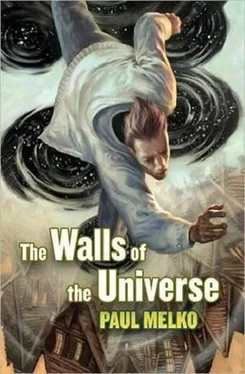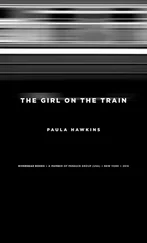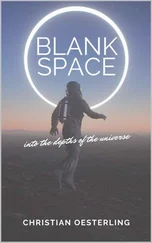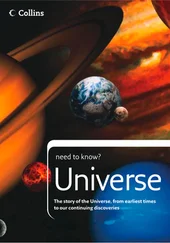John grabbed a handful of stones and, standing at the edge of the quadrangle, began flinging them at the window that he thought was Wilson ’s. He threw a dozen and started to draw a crowd of students, until Wilson looked out the window, opened it, and shouted, “Campus security will be along in a moment.”
John yelled back, “Watch this, you stupid bastard!” He toggled the device forward one universe and pulled the lever.
John Prime awoke in the night, gripped by the same nightmare, trapped in darkness, no air, his body held rigid. He sat up and flung the covers away from him, unable to have anything touching him. He ripped off his pajamas as well and stood naked in the bedroom, just breathing. It was too hot; he opened the window and stood before it.
His breathing slowed as the heavy air of the October night brought the smells of the farm to him: manure and dirt. He leaned against the edge of the window, and his flesh rose in goose pimples.
It was a dream he’d had before, and he knew where it came from. He’d transferred near Lake Erie, on a small, deserted beach not far from Port Clinton, and ended up buried in a sand dune. He’d choked on the sand and would have died there if a fisherman hadn’t seen his arm flailing. He could have died. It was pure luck that the guy had been there to dig his head out. He’d never transferred near a body of water or a river again.
That hadn’t been the only time either. In Columbus, Ohio, he’d transferred into a concrete step, his chest and lower body stuck. He’d been unable to reach the toggle button on the device and had to wait until someone wandered by and called the fire department. They’d used a jackhammer to free him. When they’d turned to him, demanding how he’d been trapped, he’d feigned unconsciousness and transferred out from the ambulance.
After that, each time he touched the trigger he did so with the fear that he’d end up in something solid, unable to transfer out again, unable to breathe, unable to move. He was nauseated, his stomach kicking, his armpits soaked, before the jumps.
It was the cruelest of jokes. He had the most powerful device in the multiverse, and it was broken.
“No more,” he said to himself. “No more of that.” He had a family now, in ways he hadn’t expected.
The confrontation with his parents had been angry, then sad, and ended with all of them crying and hugging. He’d meant to be tough; he’d meant to tell his parents that he was an adult now and could take care of himself, but his resolve had melted in the face of their genuine care for him. He’d cried, goddamn it all.
He’d promised to reconsider the letter. He’d promised to talk with Gushman again. He’d promised to be more considerate to his parents. Was he turning into Johnny Farm Boy?
Prime had gone to bed empty, spent, his mind placid. But his subconscious had pulled the dream out. Smothering, suffocating, his body held inflexible as his lungs screamed. He shivered, then shut the window. His body had expelled all its heat.
He slipped back into bed and closed his eyes.
“I’m becoming Johnny Farm Boy,” he whispered. “Screw it all.”
Prime helped his father around the farm the next day. He took it as penance for upsetting his parents. They still thought he was Johnny, and so Prime had to act the part, at least until his projects started churning.
As they replaced some of the older wood in the fence, Prime said, “Dad, I’m going to need to borrow the truck on Saturday night.”
His father paused, a big smile on his face. “Got a big date, do you?” He said it in such a way that Prime realized he didn’t think his son really had a date.
“Yes. I’m taking Casey Nicholson out.”
“Casey?” His father held the plank as Prime hammered a nail into it. “Nice girl.”
“Yeah, I’m taking her to a movie at the Bijou.”
“The Bijou?”
“I mean the Strand,” Prime said, silently yelling at himself for sharing details that could catch him up. The movie theater was always called the Palace, Bijou, or Strand.
“Uh-huh.”
Prime took the shovel and began shoring up the next post.
“What movie you gonna see?”
Before he could stop himself, he answered, “Does it matter?”
His father paused, then laughed heartily. “Not if you’re in the balcony, it doesn’t.” Prime was surprised; then he laughed too.
“Don’t tell your mother I told you, but we used to go to the Strand all the time. I don’t think we watched a single movie.”
“Dad!” Prime said. “You guys were… make-out artists?”
“Only place we could go to do it,” he said with a grin. “Couldn’t use this place; your grandpa would have beat the tar out of me. Couldn’t use her place; your other grandpa would have shot me.” He eyed Prime and nodded. “You’re lucky we live in more liberal times.”
Prime laughed, recalling the universe where the free-love culture of the sixties hadn’t ended until AIDS had killed a quarter of the population and syphilis and gonorrhea had been contracted by 90 percent of the population by 1980. There dating involved elaborate chaperone systems and blood tests.
“I know I’m lucky.”
The wind shoved at him, and, unprepared for it, John staggered into a snowdrift. He hurried to zip up his coat, then stuffed his hands into his pockets. Snow? It was only October.
He pulled himself up, leaning against the wind, and turned quickly to survey his locale. He was still on campus, but the place was desolate; the trees that had been holding leaves in the last universe were empty and black here. Dark clouds roiled above the roof of the physics building. The windows were broken out or boarded up, the doors chained shut. He smelled something burning, acrid. It was still the University of Toledo, but something was wrong here.
The snow was powdery and fine, and he guessed that it was near freezing and much colder with the windchill. John had no hat, and the wind pulled the heat from his forehead, giving him an instant headache. He turned away from the wind, but it still ripped through his coat. It was his fall coat, not his winter one. He walked with the wind, toward the center of campus.
He passed between two buildings. Ahead of him was a large open area, empty. Again the trees were black and dead, not like hibernating trees but like dead and rotten ones, as if they had not been alive for years.
He walked across the open space, staring up at the gnarled limbs. Ahead of him was a large building, the Student Union, he saw by the carved words above the door. Next to the door was a large sign, painted in red.
“The University of Toledo is closed during the current crisis until further notice.” It was dated three years prior. The sign was weathered and beaten.
What crisis would close the school? John wondered. He walked around the Student Union and found himself looking down onto a river that ran toward the northeast. He knew this was the Ottawa River and that it would ultimately dump into Lake Erie on the north side of the city. The river was frozen over.
John was cold, but he was growing accustomed to the wind. He followed the river to the southwest. There were no other footprints in the snow. No one had passed here since the snow had last fallen. He had no idea when that might have been. There was a bridge behind him, and it had not been plowed. But then university facilities would not bother plowing if the campus was closed.
Ahead of him he heard an engine running, evidence of someone alive in this universe. John ran through the snow, feeling it collect in his shoes at his ankles. He rounded a building and saw an army truck, surrounded by soldiers parked on one of the campus roads. They held weapons and watched a line of civilians standing at the back of the truck.
Читать дальше












